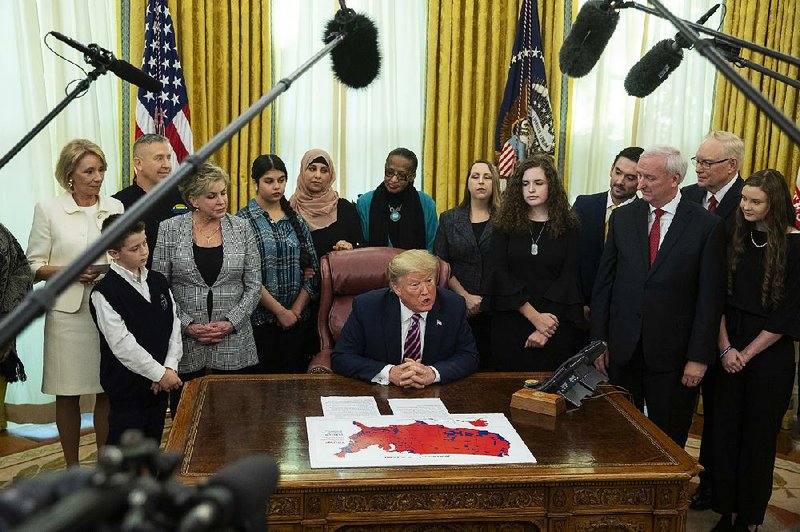President Donald Trump on Thursday vowed to protect prayer in public schools and took new steps to give religious organizations easier access to federal programs.
Speaking at an Oval Office event on Religious Freedom Day and joined by Education Secretary Betsy DeVos, Trump unveiled the federal government's first updated guidance on school prayer since 2003. It details scenarios in which school officials must permit prayer and clarifies the consequences if they don't. But overall it makes few major changes to the guidance it replaces.
"We will not let anyone push God from the public square," Trump said as he introduced the new rules. "We will uphold religious liberty for all."
Hours before the event, nine Cabinet departments proposed separate rules intended to remove barriers for religious organizations participating in federal programs. Chief among the changes is the elimination of a rule requiring religious groups to refer clients to alternative organizations upon request.
The proposals follow through on an executive order Trump signed in 2018 aiming to put religious groups on equal footing when they compete for federal grants, contracts and other types of funding.
By rallying around school prayer, Trump is rekindling a debate that reached a crescendo in the 1980s and '90s but has fallen to the periphery of national politics. Trump argued that it needs new attention as schools increasingly go too far in restricting prayer.
[Video not showing up above? Click here to watch » https://www.youtube.com/watch?v=9okU5ugMQ80]
Public schools have been barred from leading students in classroom prayer since 1962, when the Supreme Court said it violated a First Amendment clause forbidding the establishment of a government religion. Later decisions placed restrictions around prayer at graduation ceremonies and athletic events.
Civil-liberties groups say the firewall protects religious minorities and ensures equal treatment of all faiths. But many on the Christian right say courts and schools have swung too far against prayer and now interfere with the right to free religious expression.
Michael Farris, CEO and general counsel of the legal advocacy group Alliance Defending Freedom, called Trump's new school prayer guidance a "welcome step to remedy these attacks on people of faith."
"Students across our country still find their First Amendment freedoms under attack the moment they set foot on their public school campus, even denied the freedom to pray together during free times," Farris said in a statement.
The American Civil Liberties Union said Trump's new guidance is "nearly identical" to the 2003 rules and reaffirms that teachers and school officials are barred from imposing religious beliefs on students.
"Importantly, the question, as always, is whether public school officials will heed this warning. If they don't, we'll be there, as always, to correct them -- and if necessary, we'll see them in court," said Daniel Mach, director of the ACLU Program on Freedom of Religion and Belief.
The directive says students are allowed to pray alone or in groups during lunch and other free time. It says student speaking at assemblies can pray as long as they were selected to speak through a process that's based on "content-neutral, evenhanded criteria."
It also orders states to verify that school districts have no policies limiting constitutionally protected prayer, and to refer violators to the Education Department. That's much like the 2003 guidance, but the new directive goes further by requiring states to provide ways for filing complaints against schools.
Trump's other regulatory updates drew criticism from some groups that said the changes risked empowering discriminatory behavior in the name of religious freedom.
"These rules undermine the civil rights and religious freedom of millions of our most vulnerable Americans who rely on social services -- with particularly dire consequences for LGBTQ people and religious minorities," said Rachel Laser, president and CEO of Americans United for Separation of Church and State.
But Johnnie Moore, evangelical adviser to the administration, lauded the moves as a fresh sign of Trump's commitment to religious freedom.
"The White House isn't saying whether one should pray or to whom or what they should pray to," Moore said by email. He added that "they are simply making it clear that in the United States students have First Amendment rights also, and our 'separation of church and state' wasn't intended to suppress a vibrant religious life in America but to facilitate it."
Also Thursday, the White House Office of Management and Budget said in a memo that agencies must work to ensure that grant-making by entities that receive federal money, as well as their own grant-making, is in line with the Supreme Court's interpretation of the First Amendment.
A Section on 01/17/2020
